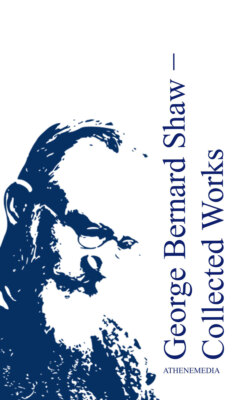Читать книгу Collected Works - George Bernard Shaw, Bernard Shaw - Страница 59
На сайте Литреса книга снята с продажи.
HOW ACQUIREMENTS ARE INHERITED
ОглавлениеBut when your son tries to skate or bicycle in his turn, he does not pick up the accomplishment where you left it, any more than he is born six feet high with a beard and a tall hat. The set-back that occurred between your lessons occurs again. The race learns exactly as the individual learns. Your son relapses, not to the very beginning, but to a point which no mortal method of measurement can distinguish from the beginning. Now this is odd; for certain other habits of yours, equally acquired (to the Evolutionist, of course, all habits are acquired), equally unconscious, equally automatic, are transmitted without any perceptible relapse. For instance, the very first act of your son when he enters the world as a separate individual is to yell with indignation: that yell which Shakespear thought the most tragic and piteous of all sounds. In the act of yelling he begins to breathe: another habit, and not even a necessary one, as the object of breathing can be achieved in other ways, as by deep sea fishes. He circulates his blood by pumping it with his heart. He demands a meal, and proceeds at once to perform the most elaborate chemical operations on the food he swallows. He manufactures teeth; discards them; and replaces them with fresh ones. Compared to these habitual feats, walking, standing upright, and bicycling are the merest trifles; yet it is only by going through the wanting, trying process that he can stand, walk, or cycle, whereas in the other and far more difficult and complex habits he not only does not consciously want nor consciously try, but actually consciously objects very strongly. Take that early habit of cutting the teeth: would he do that if he could help it? Take that later habit of decaying and eliminating himself by death—equally an acquired habit, remember—how he abhors it! Yet the habit has become so rooted, so automatic, that he must do it in spite of himself, even to his own destruction.
We have here a routine which, given time enough for it to operate, will finally produce the most elaborate forms of organized life on Lamarckian lines without the intervention of Circumstantial Selection at all. If you can turn a pedestrian into a cyclist, and a cyclist into a pianist or violinist, without the intervention of Circumstantial Selection, you can turn an amoeba into a man, or a man into a superman, without it. All of which is rank heresy to the Neo-Darwinian, who imagines that if you stop Circumstantial Selection, you not only stop development but inaugurate a rapid and disastrous degeneration.
Let us fix the Lamarckian evolutionary process well in our minds. You are alive; and you want to be more alive. You want an extension of consciousness and of power. You want, consequently, additional organs, or additional uses of your existing organs: that is, additional habits. You get them because you want them badly enough to keep trying for them until they come. Nobody knows how: nobody knows why: all we know is that the thing actually takes place. We relapse miserably from effort to effort until the old organ is modified or the new one created, when suddenly the impossible becomes possible and the habit is formed. The moment we form it we want to get rid of the consciousness of it so as to economize our consciousness for fresh conquests of life; as all consciousness means preoccupation and obstruction. If we had to think about breathing or digesting or circulating our blood we should have no attention to spare for anything else, as we find to our cost when anything goes wrong with these operations. We want to be unconscious of them just as we wanted to acquire them; and we finally win what we want. But we win unconsciousness of our habits at the cost of losing our control of them; and we also build one habit and its corresponding functional modification of our organs on another, and so become dependent on our old habits. Consequently we have to persist in them even when they hurt us. We cannot stop breathing to avoid an attack of asthma, or to escape drowning. We can lose a habit and discard an organ when we no longer need them, just as we acquired them; but this process is slow and broken by relapses; and relics of the organ and the habit long survive its utility. And if other and still indispensable habits and modifications have been built on the ones we wish to discard, we must provide a new foundation for them before we demolish the old one. This is also a slow process and a very curious one.
